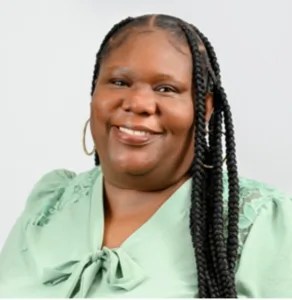Stay ahead of the curve as a political insider with deep policy analysis, daily briefings and policy-shaping tools.
Request a DemoBill to ensure rental units are fit to live in moved in Senate

Fanetta Craig lives in subsidized housing in Atlanta and has been pushing her landlord to make repairs, including to this shaky stairway rail. (Credit: Jill Jordan Sieder)
Last spring Fanetta Craig had to make an emergency move from an apartment she rented in northwest Atlanta after an inspection by the Atlanta Housing Authority found excessive mold and mildew, a structurally unsound retaining wall and a sinking driveway.
She’s now in an apartment near downtown Atlanta, which she says also has some issues. Craig’s gotten the landlord to deal with the rats, put locks on the windows and replace a broken stove, but she’s still waiting on him to replace a shaky stairway rail and address flooding in her garage.
Craig, 52, walks with a cane, and has multiple health issues, including congestive heart failure, diabetes, asthma and kidney disease. She said she’s had to move four times since 2015 due to unsafe or unhealthy conditions in subsidized housing.
“When you come into your house, you shouldn’t have to deal with hazards,” she said. “Your home should be a safe place where you’re going to have the peace that you need to live.”
A bill working its way through the Senate is meant to provide more protections for Georgia renters.
HB 404, also known as the Safe At Home Act, would require that all rental properties are “fit for human habitation.” Unlike 47 other states that have enacted similar laws ensuring habitability, HB 404 does not define what that means. But housing advocates say it is generally understood to mean that properties must meet local and state housing codes and health and safety standards.

“It will be subject to interpretation by landlords and tenants, but most importantly, by the courts,” said Elizabeth Appley, a lawyer and lobbyist who represents several housing advocacy organizations that are supporting the bill. “And the courts will be in a position to put flesh on those bones.”
The bill, which has been amended several times since it was introduced last year, also requires landlords to provide tenants who are behind on rent, utilities or other fees with three days’ written notice and a right to “cure,” or settle, the debt before filing an eviction action. It also forbids landlords from shutting off cooling along with other utilities prior to eviction, in order to force a renter out, and caps security deposits at two months’ rent.
Because the bill doesn’t address remedies for tenants if the law is broken, Appley said, “It’s also up to cities and counties to enforce existing housing code and hold property owners accountable in a meaningful way, promptly. To keep cases open, and protect people from being evicted in that process.”

The bill’s lead sponsor, Rep. Kasey Carpenter, R-Dalton, said the bill is a “measured step” meant to better protect tenants from unsafe housing conditions and unfair evictions “but doesn’t go too far to rock the boat to have unintended consequences.”
Last year while promoting the bill Carpenter said, “My family moved to 16 different rental properties throughout my childhood, so I understand the problems that many tenants face on a daily basis.”
At a Senate Judiciary committee meeting last week, Hayden Stanley, a lobbyist representing the Georgia Apartment Association, said, “We’re not asking you to amend or vote against this bill,” but wanted lawmakers to know that the several months’ lag time between an eviction judgment and a writ of possession being acted upon by law enforcement means that thousands of rental units “are held off the market” while property owners lose rental income.

Alison Johnson, executive director of the Housing Justice League, an Atlanta nonprofit, said the bill “is weak and doesn’t go far enough to protect tenants from irresponsible landlords. Because we don’t have a definitive definition of habitability, I think there are so many tenants that are still going to be fearful of reporting conditions. Because there’s so many intimidating tactics that landlords use, like not renewing leases, or increasing the rents … I think this was a way to pacify tenants and tenant advocates. But I also think it is moving the needle on tenant protections.”
Miracle Fletcher, a fair housing advocate who formerly led a group of tenants in advocating for repairs and better safety conditions when she lived in public housing, said the three-day grace period prior to eviction actions could make a big difference for some renters.

“Especially for low income renters, it will give tenants the ability to reach out for resources, as opposed to, like, ‘I got this note on my door, and I have to be out tomorrow,’ ” said Fletcher, who now serves on the Atlanta Housing Commission. “Maybe something happened with payroll, maybe they have a [housing] voucher check that’s been held up — it gives them some leeway to kind of work something out financially, even borrow the money, before all of the warrant fees and court fees and negative financial consequences of eviction rain down on them.”
Even if overdue rent is paid back, an eviction filing record remains on a renter’s credit historyand can prevent them from qualifying for public assistance or from being approved for private rentals.
“An eviction filing doesn’t come off. It’s there,” said Appley. “The Federal Reserve record says it’s just as damaging as an actual eviction. I mean, you read about these people living in extended stay hotels … and one of the reasons they end up spending a huge amount of money, I mean, more than what it would cost to rent an apartment, is because they can’t scrape together the security deposit and the first month’s rent and the last month’s rent and the utility deposit, and then this record of an eviction filing just makes it impossible.”
If it passes, Appley said, HB 404 “is a carefully crafted compromise that will provide important tenant protections that will help to keep tenants safely, stably and affordably housed.”
The bill, which passed unanimously in the House but was held up in the Senate last year, was approved as amended by the Senate Judiciary Committee last week, and now goes to the full Senate for consideration.
Read these related stories:
Have questions, comments or tips? Contact Jill Jordan Sieder on X @JOURNALISTAJILL or at [email protected].
X @STATEAFFAIRSGA
Facebook @STATEAFFAIRSGA
Instagram @STATEAFFAIRSGA
LinkedIn @STATEAFFAIRS
Professionals still face licensing delays amid state’s transition to online system
The Gist Georgia’s professionals and business owners are still struggling to obtain professional licenses in a timely manner. As the Secretary of State’s Office rolls out its new Georgia Online Application Licensing System to expedite the process, the efficiency of this new process is being put to the test. What’s Happening Thursday morning at the …
Controversy over AP African American Studies class grows
Rashad Brown has been teaching Advanced Placement African American Studies at Atlanta’s Maynard Jackson High School for three years. He’ll continue to do so — even though the state’s top education official removed it from the list of state-funded course offerings for the upcoming school year. While Brown prepares to start teaching his class on …
Students, teachers, lawmakers blast decision to end AP African American history classes
ATLANTA — A coalition of lawmakers, civil rights leaders, clergy, educators and students Wednesday called on the state’s education czar to rescind his decision to drop an advanced placement African American studies class from the state’s curriculum for the upcoming school year. “This decision is the latest attack in a long-running GOP assault on Georgia’s …
Kamala Harris’ presidential bid reinvigorates Georgia Democrats
Georgia Democrats have gained new momentum heading into the November election, propelled by President Joe Biden’s decision to bow out of his reelection bid and hand the reins to Vice President Kamala Harris. The historic decision, announced Sunday, is expected to prove pivotal in the national and state political arenas and breathe new life and …




